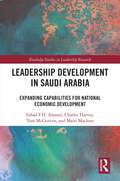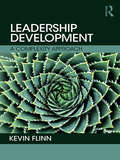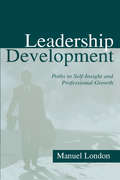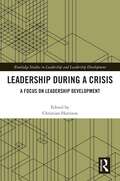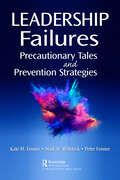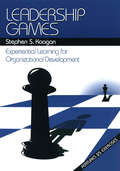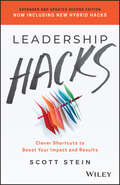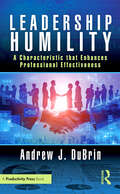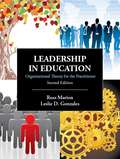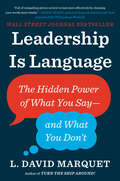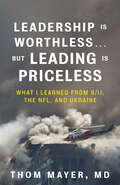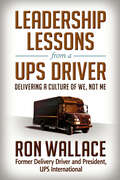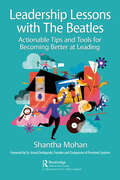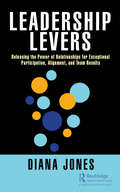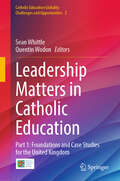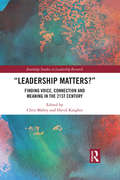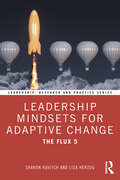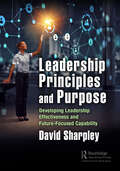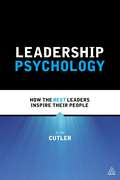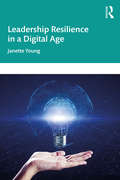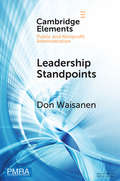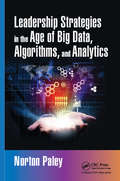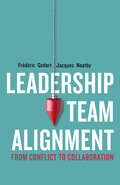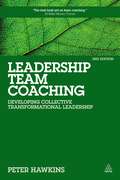- Table View
- List View
Leadership Development in Saudi Arabia: Expanding Capabilities for National Economic Development (Routledge Studies in Leadership Research)
by Charles Harvey Mairi Maclean Fahad F.H. Alanazi Tom McGovernLeadership Development in Saudi Arabia offers a comprehensive examination of the role of leadership development in expanding capabilities for national economic development, accelerating realization of the ambitious goals of Vision 2030, the country’s blueprint for socioeconomic transformation.Based on nine case studies of leading Saudi companies, this book explores how and why firms invest in leadership development and assesses its current state in Saudi Arabia. It provides insights into both organizational talent-building and the country's journey toward economic diversification. The book stands out as one of the first contextually rich in-depth studies of leadership development in a non-Western context, particularly within the ambitious framework of Saudi Arabia’s Vision 2030. Through interviews with senior executives and leadership professionals, the book provides actionable recommendations for improving leadership development practices.Readers will benefit from detailed case studies and empirical data that highlight how leadership programs can drive business growth and national economic progress. It is essential reading for academics, leadership development professionals, policymakers, and business leaders interested in understanding how leadership development supports economic growth in Saudi Arabia and how it might play an even bigger role in the future. It proposes developing fresh approaches to widening the pool of leadership talent, building on the distinctive strengths of Islamic Leadership practices.
Leadership Development: A Complexity Approach
by Kevin FlinnDrawing on the complexity sciences and personal narrative accounts of experience from practitioners based in the UK, Germany, Denmark and North America, this book examines conventional leadership development methodologies with a view to identifying what is useful and what is not. It proffers an alternative perspective on leadership and organisation for business schools, consultancies and corporate training functions to adopt in their development of leaders. Leadership Development: A Complexity Approach is essential reading for advanced students and researchers of leadership development, leadership studies, human resource management and organisational development. It will also be of interest to management educators and practising managers whose experience of, or aspirations for, working life are not represented in mainstream academic texts and popular management literature.
Leadership Development: Paths To Self-insight and Professional Growth (Applied Psychology Series)
by Manuel LondonLeadership Development explores how leaders gain and use self-knowledge for continuous improvement and career development and describes how leaders help themselves and the people with whom they work, understand themselves, and become more self-determined, continuous learners, and make the most of resources, such as feedback and coaching. This book explains why leaders need support for self-insight and professional growth in today's business environment. It explores dimensions of effective leadership in light of business, technological, and economic trends. Focusing on the importance of leaders developing accurate self-understanding, the book defines self-insight, outlines the meaning of internal strength and resilience for self-regulation, and considers how leaders attain a meaningful and realistic sense of self-identity. This volume illustrates ways organizations support these psychological processes. Leadership development is viewed as a comprehensive, continuous process that includes evaluating organizational needs and individual competencies, setting goals for career development and performance improvement, offering needed training and growth experiences, providing feedback, and tracking change in behavior and performance over time. It describes how leaders react to feedback and how 360-degree feedback survey methods and executive coaching help leaders attain and apply self-insight to enhance their performance. In addition, this book considers challenges and opportunities for leadership development, including how leaders overcome career barriers and become continuous learners.
Leadership During a Crisis: A Focus on Leadership Development (Routledge Studies in Leadership and Leadership Development)
by Christian HarrisonWe live in uncertain times propelled by complex systems, climate change and the use of technology which possess various threats. At times of crisis, leadership that permits quick reactions to the changing organisational environment becomes necessary. However, there has been limited studies that provide a road map of leading during a crisis. What is required of leaders during a crisis? How can you develop the required leadership expertise during such turbulent periods? What are the challenges leaders will have to combat? Through this book, these questions are answered. It is no exaggeration therefore to claim that this book opens a new chapter as it seeks to advance discussions about how to lead during crisis. Drawing on empirical and conceptual evidence from the perspective of renowned authors in leadership research, it offers a robust and engaging overview of the field of leadership and leadership development in turbulent and dynamic environments. The chapters in the book support the personal and professional development of aspiring and experienced leaders and managers. The readers will be able to display critical awareness of current developments in both the theory and practice of leadership and leadership development and its importance in modern organisations.
Leadership Failures: Precautionary Tales and Prevention Strategies
by Peter Fenner Kate M. Fenner Mark W. ReifsteckHumans make mistakes. Many of us lose career ascendency or risk destroying our institutions by doubling down on or ignoring outcomes of our own poor decisions. Good leaders learn and teach from their errors. Professions are strengthened. Institutions thrive. Careers grow. Through real-life stories that focus on senior/board leadership from multiple walks of life, and brief discussions of significant attributes, readers will be challenged to diagnose and turn missteps into positive growth experiences. The authors of this book have had extensive careers in public and private, for-profit and not-for-profit settings, and in independent and government-sponsored consulting, development, academic, and clinical environments. Without having any single leadership paradigm to push, they raise questions about outcomes for institutions that are affected and individual career paths. Their cautionary tales ask readers to think through "next steps" or prevent the need to get there; hence, this is an ideal extra-assignment book in graduate management courses and for managers seeking to work their way up toward higher leadership roles. Board members also can learn from its non-industry-specific target readership.
Leadership Games: Experiential Learning for Organizational Development
by Dr Stephen S. KaaganLeadership Games presents twenty-five practical, inexpensive experimental activities designed to be used in various leadership training and development programmes.This book centers on those areas of primary concern to todays managers, team leadership, risking innovation, fostering collaboration, managing conflict, and using diversity. The author has extensive experience both in the academic and consulting word (including being a past President of the Outward Bound program in Rockland, Maine).
Leadership Hacks: Clever Shortcuts to Boost Your Impact and Results
by Scott SteinHack your leadership and improve your approach With rapid change and hybrid workplaces becoming the new way of working, leaders are struggling to achieve their outcomes. How do you stay ahead in the face of constantly shifting priorities, competitors, and deadlines? With this fully revised and updated edition of Leadership Hacks, you&’ll discover how to cut through the madness and get back to achieving results. Author Scott Stein helps leaders—from CEOs to frontline managers to small business owners—identify ways to make a difference to the people they manage and the tasks they undertake. Here, he details proven hacks at every level: personal, one-on-one, team, hybrid and remote. With his tips, shortcuts and advice, you can rise above the daily deluge and make real progress. This is a book for leaders looking for the life, work, and business hacks that will help you manage and inspire others. Whether you&’re feeling burned out or thriving but still looking for better strategies to get things done and stay on top, this book will open your mind to new possibilities. If you&’re leading a hybrid workforce, you&’ll especially love the hacks for keeping your people productive and reducing costs. identify what distractions slow you down fast-track your productivity to do more in less time streamline delegation so your people perform faster learn the communication and technology shortcuts that get faster results create and lead a hybrid workforce that increases performance. Leadership Hacks shows you how to hack your day, shift your approach and boost your communication so you can lead in a more effective and efficient way, no matter where your team is.
Leadership Humility: A Characteristic that Enhances Professional Effectiveness
by Andrew J. DuBrinThis book deals in depth with an ancient attribute of effective leaders that has in recent years caught the attention of leadership writers and researchers. Today’s effective leader is expected to demonstrate humility in addition to standard leadership attributes such as self-confidence, high-level cognitive skills, creativity, charisma, and the ability to articulate visions. The theme of this book is that leadership and professional effectiveness are enhanced when interspersed with other key leadership attributes including those mentioned above, assertiveness, a sense of humor, and strategic thinking ability. Many brash and aggressive successful leaders would be even more successful if they sprinkled their leadership approach with humility.This book describes an opinion about the most relevant aspects of humility as it applies to leadership and professional effectiveness, yet the emphasis is on leadership. Equally important, each chapter contains suggestions for making better use of humility. Humility as it relates to leadership and professional effectiveness is covered from many angles. Among these topics are the many meanings and components of humility and how leadership humility impacts group member performance and behavior. We also describe the attributes of humble leaders and professionals and their type of interpersonal relationships. Servant leadership, because of its tie-in with humility, receives a separate chapter.A description is provided about how narcissism, hubris, and charisma can be blended with humility to improve leadership effectiveness. Two other key topics are developing and enhancing your humility and making effective use of humility in leadership and professional life. The major contribution of this book is its systematic presentation of applied information about humility related to leadership effectiveness, such as the impact of humility on job performance and employee behavior, and how humility is part of servant leadership. At the same time, the book provides practical guidelines for applying the information to make optimum use of humility in the workplace.
Leadership In Education: Organizational Theory For The Practitioner
by Russ Marion Leslie D. GonzalesLeadership in Education: Organizational Theory for the Practitioner
Leadership Is Language: The Hidden Power of What You Say--and What You Don't
by L. David MarquetFrom the acclaimed author of Turn the Ship Around!, former US Navy Captain David Marquet, comes a radical new playbook for empowering your team to make better decisions and take greater ownership.You might imagine that an effective leader is someone who makes quick, intelligent decisions, gives inspiring speeches, and issues clear orders to their team so they can execute a plan to achieve your organization's goals. Unfortunately, David Marquet argues, that's an outdated model of leadership that just doesn't work anymore.As a leader in today's networked, information-dense business climate, you don't have full visibility into your organization or the ground reality of your operating environment. In order to harness the eyes, ears, and minds of your people, you need to foster a climate of collaborative experimentation that encourages people to speak up when they notice problems and work together to identify and test solutions. Too many leaders fall in love with the sound of their own voice, and wind up dictating plans and digging in their heels when problems begin to emerge. Even when you want to be a more collaborative leader, you can undermine your own efforts by defaulting to command-and-control language we've inherited from the industrial era.It's time to ditch the industrial age playbook of leadership. In Leadership is Language, you'll learn how choosing your words can dramatically improve decision-making and execution on your team. Marquet outlines six plays for all leaders, anchored in how you use language: • Control the clock, don't obey the clock: Pre-plan decision points and give your people the tools they need to hit pause on a plan of action if they notice something wrong. • Collaborate, don't coerce: As the leader, you should be the last one to offer your opinion. Rather than locking your team into binary responses ("Is this a good plan?"), allow them to answer on a scale ("How confident are you about this plan?") • Commit, don't comply: Rather than expect your team to comply with specific directions, explain your overall goals, and get their commitment to achieving it one piece at a time. • Complete, not continue: If every day feels like a repetition of the last, you're doing something wrong. Articulate concrete plans with a start and end date to align your team. • Improve, don't prove: Ask your people to improve on plans and processes, rather than prove that they can meet fixed goals or deadlines. You'll face fewer cut corners and better long-term results. • Connect, don't conform: Flatten hierarchies in your organization and connect with your people to encourage them to contribute to decision-making.In his last book, Turn the Ship Around!, Marquet told the incredible story of abandoning command-and-control leadership on his submarine and empowering his crew to turn the worst performing submarine to the best performer in the fleet. Now, with Leadership is Language he gives businesspeople the tools they need to achieve such transformational leadership in their organizations.
Leadership Is Worthless…But Leading Is Priceless: What I Learned from 9/11, the NFL, and Ukraine
by Thom MayerPractical leadership for difficult times, from a crisis management expert who has led response teams through the 9/11 Pentagon attack, NFL on-field medical emergencies, and the war in Ukraine.Dr. Thom Mayer knows first-hand that true leadership stems from our actions, not our positions, especially in times of crisis.Drawing on his experiences heading the 9/11 Pentagon rescue efforts, dealing with on-field emergencies in the NFL (he was at Damar Hamlin’s bedside after his injury), training mobile response medical teams in Ukraine, and more, Mayer covers such topics as:Why trust is vital for innovationThe critical role of failure in devising new ways of leadingHow questions fuel innovative actionWhy every leader should have the title Chief Story TellerThe importance of distinguishing between data, knowledge, and wisdomEach chapter begins with a provocative and seemingly contradictory statement, like the book’s title, and includes stories, historical examples, and literary lessons selected to guide pragmatic and practical solutions.Leadership is worthless because it is something you say, a noun. But leading is priceless because it is a verb—it is the things we do that make a difference. From Pentagon generals to corporate CEOs to football players on the field to parents driving their kids to school, Mayer shows how leaders ensure that their actions will help others to succeed.
Leadership Lessons from a UPS Driver: Delivering a Culture of We, Not Me
by Ron WallaceUnited Parcel Service (UPS) is a household name that customers and investors alike hold in high regard. Who hasn't been delighted by a right-on-time delivery, one of the 18 million UPS makes every day? Founded over a hundred years ago, UPS has moved steadily up the Fortune 500 while so many other corporations have disappeared. What's the company's secret? Just ask a driver!Ron Wallace was a UPS delivery driver for six years before he began rising through the ranks, ultimately becoming president of UPS International. In other companies, that might be extraordinary, but at UPS it's par for the course. UPS has a unique corporate culture. It's like a family. Package loaders call executives by their first names and vice versa. The company almost always promotes from within. Lifetime employment is common. Most employees own UPS stock. Wallace credits the company's success—and his own—to its culture of "we, not me." As he puts it, working at UPS gave him a PhD in teamwork. Instead of writing a typical business memoir that celebrates the leader as celebrity, Wallace shares vivid stories that focus on the people he worked with, the challenges they overcame, and the simple principles and practices that make up the UPS way. He exhorts his readers to grow their people, not just their business plans. The leadership style described in this book is simple and direct—and it works. The straightforward and easy-to-understand lessons provide a blueprint for an individual or company to build on past successes and adapt to future challenges. This is a must-read for anyone aspiring to become a great leader.
Leadership Lessons with The Beatles: Actionable Tips and Tools for Becoming Better at Leading
by Shantha Mohan"I can think of at least two good reasons for reading this delightful book. First, the leadership lessons that include the author’s story are as engaging as they are compelling. A brilliant student who studied engineering while becoming fascinated by leadership at an early age, Shantha Mohan jumps off the page in a way that makes you wish she was a friend living nearby. Second, it’s just plain fun to think about these old Beatles songs as leadership lessons." – Amy C. Edmondson, Professor, Harvard Business School; Author of The Fearless Organization: Creating Psychological Safety in the Workplace for Learning, Innovation, and Growth "Leadership Lessons with The Beatles is an extraordinary literary tour de force and a worthy addition to the catalog of must-have actionable business books. Shantha has written an accessible and practical book for aspiring leaders, existing leaders, and anyone interested in developing important skills for the 21st century economy. Of course, fans of The Beatles, like myself, will get a particular kick from Shantha’s approach to the subject matter. – Jonathan Reichental, Founder, Professor, and Author Leadership has gone through many changes in the last couple of decades. We have realized that outstanding leadership is not about being authoritarian and exercising control. It is not only about the intelligence quotient (IQ) but also about emotional intelligence. To be an exceptional leader, you need several essential skills, all of which you can learn. The skills are nuanced with emotional intelligence, which you can gain. This book is unique: the author weaves leadership ideas with the song titles of The Beatles, making this book fun, playful, thoughtful, and valuable. Each chapter is organized with the key message on a leadership attribute prompted by a Beatles’ song title, tips on becoming better on the topic, a practice suggestion, questions to ask yourself to think about the message, and resources for more reading. The author begins each chapter with how and why she chose the song and includes fun facts. It’s an engaging book that blends the words of perhaps the greatest rock band ever—The Beatles—with the basic principles for becoming a better leader.
Leadership Levers: Releasing the Power of Relationships for Exceptional Participation, Alignment, and Team Results
by Diana JonesThere’s an epidemic of leadership failure—whether something as small as a meeting, or as large as implementing enterprise wide change. Leaders know that sinking feeling when a gap emerges between themselves and the groups they most need to engage with. Leaders and business schools are looking in the wrong places for the cause. What holds most leaders back, as if their foot is always on the brake, is their failure to engage, and gain alignment. This book shows the reasons why. Leaders rarely recognise that: Shaping group behavior is describable as a process, which they can learn. Instead, they unconsciously fall into relationship patterns influenced by early family experiences. Informal relationship patterns have a dramatic effect on results, which is why birds in flight manage to alter course without bumping into each other. Leadership and collaboration are primarily a matter of principles and process, and not personality and content alone. If leaders master the process, they achieve consistent results. This book reveals the leadership levers to release the power of relationships for exceptional participation, alignment and results in organizations. It enables leaders to mine the brilliance that often lies dormant and untapped within their organizations. Readers will have the principles and tools to go beyond the agenda, truly engage with those around them, and release untapped capacities within their organizations. These qualities and skills will inspire associates and employees.
Leadership Matters in Catholic Education: Part 1: Foundations and Case Studies for the United Kingdom (Catholic Education Globally: Challenges and Opportunities #2)
by Quentin Wodon Sean WhittleThis edited collection is the first part of a two-volume set., which focuses on leadership in Catholic education settings in the United Kingdom. It includes an overview of the importance of different types of leadership, including ‘servant-leadership’, in understanding and framing Catholic school practice, a critical survey of why leadership matters to ensuring the success of Catholic education, and a discussion of what counts as the defining characteristics of leadership in Catholic education and how this relates to the aims or philosophy of Catholic education. The chapters in this book draw from the insights and experiences of serving Catholic school leaders as well as from academics and researchers in Catholic education studies. The final two chapters provide a comparative analysis for the United Kingdom in a global perspective using data from the Organisation for Economic Co-operation and Development (OECD) . Together, the chapters argue that there is an urgent need to find, nurture, and sustain outstanding leaders for Catholic schools and colleges.
Leadership Matters: Finding Voice, Connection and Meaning in the 21st Century (Routledge Studies in Leadership Research)
by Chris Mabey David KnightsIn recent years we have seen what could be described as a moral meltdown in the corporate corridors of power. Few sectors have escaped high profile scandals, with public officials and leaders guilty of malpractice, duplicity, fraud and corporate malfeasance. Conventional leadership theories appear to be inadequate to equip those with power to act ethically and responsibly. At a more macro level, many of the social and environmental problems we face in the 21st century could in fact, be described as spiritual in nature, rooted in a flawed human condition. Leadership Matters brings together an eclectic mix of authors of different faith traditions, to explore what this spiritual and cultural transformation might look like. For too long we have relied on external codes of conduct, which are, at best, blunt instruments for creating ethical practice. So, chapter by chapter, this book examines our interior lives from the perspective of mind, body and soul. The unashamed premise of this book is that true and influential leadership comes from the inside with each chapter presenting what it means to lead respectfully, critically, responsibly and humbly in the gritty reality of the twenty first century workplace. This volume will be of keen interest to academics and practitioners in the field of leadership and the related disciplines.
Leadership Mindsets for Adaptive Change: The Flux 5 (Leadership: Research and Practice)
by Sharon Ravitch Liza HerzogThis informative and practical book helps leaders develop adaptive leadership mindsets and skills to address the myriad intersecting challenges shaping today’s workplace. Through the Flux 5 framework, organizational culture and systems experts Sharon Ravitch and Liza Herzog help leaders, teams, and organizations create the organizational conditions to drive and enact adaptive change. At a time of unprecedented workplace flux, leader roles are constantly being redefined, requiring more finely attuned leader mindsets, frames for leadership, and skillsets for moving the dial on individual and organizational sense-making for cultural and institutional excellence. Based on five mindsets – Inquiry Mindset, Humanizing Mindset, Systems Mindset, Entrepreneurial Mindset, and Equity Mindset – the Flux 5 framework teaches leaders to drive adaptive change as a tool of professional and organizational development. Using embedded leader learning activations and organizational practices, the book guides leaders to develop each mindset as they read. The book encourages leaders (and their organizations in diffusion effect) to cultivate a visionary and resonant leadership approach at the intersection of crisis leadership, professional and human development, systems thinking, entrepreneurial leadership, and organizational equity frameworks. Succinct, accessible, pragmatic, and inspiring, this useful guide will grab the interest of leaders, teams, and organizations across sectors, organizational types, and business contexts, and engage professors, students, and practitioners of leadership, management, organizational psychology, and organizational development.
Leadership Principles and Purpose: Developing Leadership Effectiveness and Future-Focused Capability
by David SharpleyThis book provides a fresh perspective on leadership and the steps required to achieve high performance. It explores how we create purpose by moving from vision and values through principles to action.Effective leaders do not only support and develop people --They develop systems (anchored in principles and procedures) that support future-focused capability. We all benefit from understanding the elements that contribute to exceptional leadership. Increasingly, we also need to appreciate the building blocks that link to sound corporate governance. Hence, the focus is on Environmental and Social Governance (ESG).The book explains how principles shape competencies and build motivation and commitment. The insights also reveal the importance of confirmed competence. This enhances self-belief and increases personal confidence when faced with challenging situations. It adds to resilience. Building on principles helps clarify how energy is best directed to achieve high performance. This also ensures consistency of approach. Values need to be made explicit through principles, which support the design of systems and help shape the culture of the workplace. Principles have relevance for managers, team leaders, and professionals who want to gain insight into how we enhance motivation and commitment at work. However, the information contained in this book goes further as it also raises self-awareness and encourages reflection on the broader issue of how people find meaning and purpose.
Leadership Psychology
by Alan CutlerA better understanding of the psychological relationships at play within current working environments will enable leaders to achieve greater success for themselves and their organizations. Leadership Psychology outlines how inspirational leaders across a range of award-winning companies of all sizes understand their employees' psychological needs and use that knowledge to affect behaviour and enhance performance. The book showcases examples of leadership best practice in businesses featured in The 2013 Sunday Times 100 Best Companies to Work for Survey. Exclusive information gained through interviews with the most highly regarded leaders of a special selection of these winning companies is analyzed and critically evaluated, using the underpinning principles of occupational psychology to reveal modern trends in working practice. This book provides up-to-the-minute practical guidance, based upon a rigorous psychological foundation, to executives holding operational or strategic leadership positions in businesses of all shapes and sizes.
Leadership Psychology: How the Best Leaders Inspire Their People
by Alan CutlerA better understanding of the psychological relationships at play within current working environments will enable leaders to achieve greater success for themselves and their organizations. Leadership Psychology outlines how inspirational leaders across a range of award-winning companies of all sizes understand their employees' psychological needs and use that knowledge to affect behaviour and enhance performance. The book showcases examples of leadership best practice in businesses featured in The Sunday Times 100 Best Companies to Work for Survey. Exclusive information gained through interviews with the most highly regarded leaders of a special selection of these winning companies is analyzed and critically evaluated, using the underpinning principles of occupational psychology to reveal modern trends in working practice. Leadership Psychology also includes unique information based on the author's discussions with military professionals at Sandhurst, sharing one-of-a-kind insights about what makes a strong leader under pressure. With updated looks at the unwritten 'psychological contract,' between employers and employees and a new analysis of Herzberg's motivational hygiene theory, Leadership Psychology is an original and timely addition to studies of leadership in the context of motivational factors.This book provides up-to-the-minute practical guidance, based upon a rigorous psychological foundation, to executives holding operational or strategic leadership positions in businesses of all shapes and sizes.
Leadership Resilience in a Digital Age
by Janette YoungThe book focusses on the challenges faced in the digital age, and the increasing demands for continuous change in an inter-connected digital world. The book presents stories about how leaders have faced significant challenges and pressure, and how they have used these experiences as catalysts to transform, flourish, and develop personal resilience. The book explores the digital journey, ethical issues, teamwork, styles of leadership, agile, collaboration, trust, culture, psychological safety, self-awareness, vulnerability, conversation, positivity, emotional intelligence, creativity, inner knowing and the dark side of leadership. Drawing on the experiences of leaders in the creative, digital and technology sectors in the UK, and using their voice throughout, has resulted in proposing several internal and external strategic solutions to help the reader become more personally resilient. The book explores the impact of continuous change within a digital age, presenting the facets necessary to become a Digital Sage in an increasingly chaotic world. With a focus on creativity, innovation and mind and body awareness the leader as a Digital Sage arises to encourage resilience in a digital age. The book does not assume prior knowledge of the field of resilience and is ideal for executive education courses, and for leaders and managers seeking personal and professional transformation.
Leadership Standpoints: A Practical Framework for the Next Generation of Nonprofit Leaders (Elements in Public and Nonprofit Administration)
by Don WaisanenThis project offers a new leadership framework for the next generation of nonprofit professionals. Based on five years of data collected from the New York Community Trust Leadership Fellowship – designed to address leadership development gaps in the nonprofit sector – it constructs three dimensions and eleven themes for the theory and practice of leadership standpoints. Leadership standpoints is a framework for practicing inclusion, building spaces for performance, and thinking and acting with range. Those using leadership standpoints continuously interact with diverse stakeholders, constantly verifying others' views and interests, remaining keenly attentive to power distributions, material constraints, and hidden or unacknowledged voices that need surfaced, while expanding their personal and social outlooks to elevate performance and meet pressing demands best addressed through broadly informed decisions. I provide an overview of leadership standpoints as an aspirational, democratic, grounded form of leadership within everyone's reach.
Leadership Strategies in the Age of Big Data, Algorithms, and Analytics
by Norton PaleyHarnessing the power of technology is one of the key measures of effective leadership. Leadership Strategies in the Age of Big Data, Algorithms, and Analytics will help leaders think and act like strategists to maintain a leading-edge competitive advantage. Written by a leading expert in the field, this book provides new insights on how to successfully transition companies by aligning an organization’s culture to accept the benefits of digital technology. The author emphasizes the importance of creating a team spirit with employees to embrace the digital age and develop strategic business plans that pinpoint new markets for growth, strengthen customer relationships, and develop competitive strategies. Understanding how to deal with inconsistencies when facts generated by data analytics disagree with your own experience, intuition, and knowledge of the competitive situation is key to successful leadership.
Leadership Team Alignment: From Conflict to Collaboration
by Frédéric Godart Jacques NeatbyDebunking much of the received wisdom regarding the sources of leadership team dysfunctionality, Leadership Team Alignment presents a targeted strategy for building and managing a top executive team to gain competitive advantage. Frédéric Godart and Jacques Neatby bring a wealth of practical experience and in-depth knowledge, with over eight hundred hours of direct observation with more than fifty leadership teams across the globe and thousands of hours working with executives. With this book, they offer solutions to manage conflict and create environments that effectively address misalignments in organizations. Godart and Neatby take readers through the dual role of leadership team members, the challenges of power games, and the risks of siloed leaders. They give clear advice on how to improve aspects of any leadership team, based on its size and structure and the nature of the organization. While organizational challenges may be inevitable, this book provides leadership teams the tools to correctly diagnose leadership team misalignment, with evidence-based remedies and strategically oriented interventions to maximize organizational performance.
Leadership Team Coaching
by Peter HawkinsOrganizations are most effective when the teams responsible for the organization's success are performing to their maximum potential. If the relationships within a team work well, and all team members have a clear focus, this has a significant positive impact on achieving goals and delivering results. Leadership Team Coaching takes an integrated, systemic approach which provides a thorough understanding of the role and importance of the team to organizational objectives, offering the practical tools and techniques essential to facilitate optimum team performance through transformational leadership. Peter Hawkins draws on the latest research to give a practical roadmap for developing people from disparate groups into a high performing team that can transform your business. This second edition includes new chapters on how to select the players for a high performing team, and on how CEOs can develop effective teams with shared leadership, as well as new international case studies.
